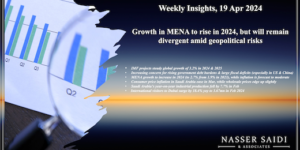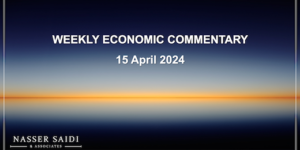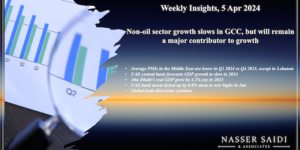Markets
Progress in the Greek debt negotiations alongside strong US data led to upbeat market sentiment. Better than expected financial results of GCC companies, amid positive news from the global markets, supported rallies in the region’s stock exchanges leading to substantial gains in Kuwait and Dubai bourses. The euro gained against the dollar and yen towards the end of last week as the Greece dilemma seemed closer to a resolution; the pound also gained against the dollar, given the rise in retail sales. Both gold and oil prices were up, with Middle East tensions sending oil prices higher.
Global Developments
Americas:
- The US 2013 Federal budget aims to reduce discretionary spending by USD 1 trillion from 8.7% of GDP in 2011 to 5% in 2022. Additionally it aims to cut USD 4 trillion in spending programs by 2018, to bring the deficit below 3% of GDP, stabilize the debt-to-GDP ratio and achieve a primary balance. In 2012 the deficit will still be 8.5% of GDP due to come down in 2013 to 5.5% of GDP. Not unexpectedly, there is hardly a hint of fiscal discipline in an election year.
- Bi-partisan agreement was reached allowing for an extension of the payroll-tax holiday and extended unemployment benefits.
- US retail sales recorded a mild increase in Jan of 0.4% mom, sa, after coming in flat in Dec, held down by a decrease in car sales.
- Industrial production remained flat in Jan (0.7% gain in manufacturing), with IP for Dev revised to 1.0% mom from the previously reported 0.4%. Factory output surged 0.7% and utility output fell 2.5% while capacity utilisation decreased to 78.5%.
- CPI was up 0.2% mom and 2.9% yoy in Jan as energy costs increased (for the first time since Sep) while core CPI was up 0.2% mom and 2.3% yoy (the fastest since Sep 08). PPI was up 0.1% mom in Jan while the core PPI was higher-than-expected at +0.4%.
- More good news came via housing starts that continued to rise in Jan, recording an uptick of 1.5% mom to 699k andinitial jobless claims unexpectedly declined 13k to 348k- the lowest since March 2008, reinforcing a labour market turn around.
Europe:
- The Greek Parliament approved the austerity measures requested by the troika to release the second tranche of the rescue package amid street protests and violence. The deal is unlikely to put the country back on its feet as it neglects the key structural problems. GDP fell 6.8% in 2011.
- Euro area GDP fell 0.3% qoq in Q4 (+0.1% in Q3) and 0.7% yoy, as expected. The French economy posted a 0.2% qoq increase in Q4 GDP, or 1.7% for the year. German GDP dipped 0.2% qoq in the same period, a smaller-than-expected drop. Italy’s GDP fell 0.7% qoq in Q4 and increased 0.5% yoy driving the country into technical recession. Portugal also experienced a 1.3% qoq contraction in Q4 GDP and 2.7% yoy. Spanish Q4 GDP shrank 0.3% qoq but rose 0.3% on a yoy basis.
- Moody’s downgraded six European nations, including Italy (A3 from A2), Spain (A3 from A1) and Portugal (Ba3 from Ba2) while putting England and France’s on negative outlook, which might lead to a downgrade from the top AAA rating.
- UK inflation for Jan 2012 fell to 3.6% (Dec: 4.2%), recording the lowest annual rate of inflation since Nov 2010, but still remains well above the BoE’s 2% target rate.
- Retail sales volumes in UK increased 0.9% mom and 2.0% yoy in Jan, building on the 0.6% rise in Dec; this was largely due to the 4.8% monthly rise in household goods sales.
- EU IP in Dec fell 1.1% mom, dropping 3.6% since Aug with sharply diverging performances in Germany and in EuropeanMediterranean countries.
Asia and Pacific:
- The PBoC announced a cut in banks’ reserve requirements by 50bps (effective Feb 24) to encourage lending; this cut would decrease the ratio to almost 20.5% for China’s larger banks and is expected to release almost CNY 400bn.
- China’s Premier Wen Jiabao pledged to invest in Europe’s bailout funds and sustain its holdings of euro assets. However the Governor of the central bank added that the BRICS have to wait for the right time and right opportunity to invest.
- January’s home prices in China recorded the worst performance in a year, with none of the 70 cities monitored posting a gain, a reflection of the government’s 2-year effort to curtail rising home prices in the country.
- Japan Q4 GDP fell 2.3% qoq, saar ending another bad year where GDP fell 0.9%. Net trade was the counterpart to the Q4 GDP decline, while domestic demand rose slightly in Q4 with private domestic demand up about 0.6% qoq, saar. Industrial production was revised down to 3.8% in Dec, (initial reading of 4%) and the capacity utilization index saw a rise of 3.1% in Dec mom.
- Indian wholesale price inflation hit a 26-month low, coming in at 6.55% in Jan (Dec: 7.47%) driven down by lower vegetables’ prices.
- Malaysia’s Q4 GDP rose 5.2% yoy (Q3: 5.8%), taking the full year growth to 5.1% in 2011 (2010: 7.2%). Singapore’s Q4 GDP shrank 2.5% qoq, saar; for 2011 GDP was up 4.9%, significantly lower than 2010’s 14.8% growth.
Bottom line:
Markets are holding on the hope that central bank aggressive unorthodox monetary measures will overcome all problems irrespective of the lack structural policy reforms which, in any case, governments are deemed inadequate to enact. Unfortunately this myopia has already caused another bout of the crisis in H2 2011. The next most awaited event is the meeting of Eurozone Finance Ministers called to decide on the Greek package tomorrow.
Regional Developments
- The GCC Development Fund has allocated USD 2.5bn to Jordan in support of projects and the country will also receive additional aid from the US, which has put aside USD 770mn for projects in the Middle East.
- Oil industry experts form JP Morgan and Barclays expect MENA countries’ investment in the sector to increase 11% in 2012 due to the growing demand, reorientation of oil delivery channels to Europe, and need for reconstruction in North Africa.
- Kuwait’s new cabinet was sworn in on Tuesday, amid opposition as the majority from the Feb 2 election outcome were sidestepped. Meanwhile, the Governor of the Central Bank of Kuwait (in post for past 25 years) resigned to protest against excessively expansionary fiscal policy driven by higher oil revenues. He argued that unreasonably high projected budgetary current expenditure, especially spending on public wages and subsidies, in contrast to relatively low investment, prevent addressing structural gaps, and undermine fiscal and monetary sustainability.
- The Central Bank of Egypt left its policy interest rates unchanged at 9.25% (overnight deposit) and 10.25% (lending). This comes in contrast to analysts’ expectations of raising rates to slow down local currency depreciation, and foreign exchange reserves depletion, indicating monetary authority’s fears of the negative effect on economic growth of higher interest rates. The Egyptian government is seeking ways to prevent financial disruption, and has turned to the IMF with a request for 18-month arrangement, worth some $3.2 billion. Local financial experts and government officials consider Fund’s assistance as crucial, which may open Egypt’s doors to the other international financial institutions.
- Financial inflows into Lebanon, comprising mostly of non-resident deposits, remittances and cash from tourists, decreased by 18% and amounted USD 13.9bn in 2011 compared to USD 17bn in the previous year.
- Saudi banks’ profits reached SAR 30.9bn last year, 18% higher than in 2010, while credit portfolio totalled SAR 856bn and deposits – SAR 1.1 trillion.
- Turkey’s consumer confidence index increased slightly to reach 92.2 in January, however remaining below the 100 level, the pessimism/optimism threshold.
- Inflation data were released in Oman, Qatar and Saudi Arabia: 12-month inflation in Oman fell in Dec to 3.3% – the lowest level since July 2010 – as food prices mostly stabilized or fell. Qatar’s Jan CPI rose 1.2% yoy and Saudi Arabia inflation in Jan was 5.3% yoy, unchanged from Dec.
- Turkey’s current account deficit decreased on an annual basis, at USD 6.6bn in Dec, compared to USD 7.5bn a year earlier, but widened from Nov’s USD 5.4bn. Turkey’s unemployment dropped to 9.1% in Nov 2011 from 11% in the same period a year earlier.
- A Standard & Poor’s report examined the growing acceptance of the Sukuk Market, stating that the global crisis and the subsequent withdrawal of European investors has resulted in Middle East and Asian markets turning to local investors to fund infrastructure projects. Another S&P report highlighted the rising political and economic risks for issuers in the Middle East conditional on the developments with regard to Iran, with analysts considering different scenarios including blockade of the Strait of Hormuz and military confrontation.
- Both Deloitte & PwC released reports on IPO activity in the MENA/ GCC region, pointing to a weak year in 2011 and a challenging 2012. According to Deloitte, on the positive side, companies launching an IPO “will attract greater investor interest, experience a shorter and more efficient IPO execution and approval process”. PwC meanwhile commented that in 2012 there would be “improvements in confidence on the supply side”, leading to “increased activity in certain regional markets” while “Sukuk would continue to be a popular mode of financing in the GCC for both the private and public sector”.
UAE Focus
- Dubai’s GDP is expected to grow at 4.5-5% in 2012, according to Shaikh Ahmad Bin Saeed Al Maktoum, supported by trade, tourism and transport.
- The top 100 best performing small and medium enterprises (SMEs) in Dubai boast a total of AED 2.3bn in turnover, combined assets of AED 1.4bn and profits of AED 220mn. Dubai’s SMEs account for 95% of companies and 40% of the workforce.
- Secure Collateral Lending. The Ministry of Finance, signed an agreement with the International Finance Corporation (IFC) to establish a nation-wide registry where companies can list corporate assets, from equipment, to inventory, to accounts receivables in order to obtain secured credit.
- Expatriate remittances from the six million foreigners in the UAE amounted to USD 49bn over 2006-2010, according to the Arab Monetary Fund.
- The UAE has the largest share of the USD 1 trillion worth of construction projects to be completed by 2020 in the GCC – at USD 636bn.
- An Economist Intelligence Unit (EIU) report placed 2011 GDP growth in the UAE nearly 3.3%, expecting a higher rate in 2012 owing to increased oil output to offset a decrease in crude exports from Iran. Growth in 2011 more than doubled from 2010’s 1.4%.
- Oliver Wyman estimated that the introduction of energy efficient technologies would lead to a reduction in energy costs by almost USD 3bn a year by 2030 in the UAE. By 2030, assuming constant electricity production costs, the UAE can save 51% of energy used in the residential sector, 38% in the commercial sector and 11% in the industrial sector.
- Brazilian Trade and Industry Minister emphasized his country’s intention to promote a free trade agreement between the Mercosur and the GCC, during his visit to Dubai. Several Memorandums of Understanding were signed between the Brazilian Trade and Investment Agency (APEX-Brazil) and Jebel Ali Free Zone Authority, Dubai Media City, Dubai Export Development Corporation and Dubai Foreign Direct Investment.





